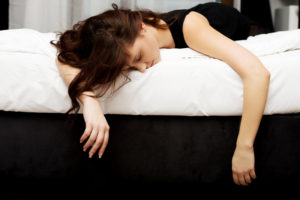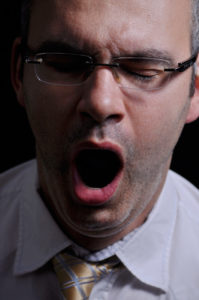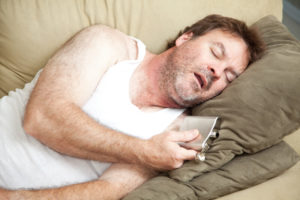There is more refreshment and stimulation in a sleep, even of the briefest, than in all the alcohol ever distilled.
E.V. Lucas (1868–1938) English playwright and novelist
Many people believe in the power of alcohol to get a good night’s rest.
There’s even a special word for it, a nightcap.
On the surface, it seems logical. You drink, you pass out (fall asleep).
Some sleep is better than none, right?
After all, you don’t have to drink too much alcohol. You can drink just enough.
And if you drink too much, so what? After all, lying on the floor, even with drool coming out of the corner of your mouth, it looks like you’re sleeping.
Anybody who’s watched you might think you were sleeping.
Fact is, while you do pass out, alcohol interferes with the quality of your sleep. It disrupts the sleep cycles. That’s why you can feel terrible when you wake up.
“Sometimes I drink more than I need
Until the TV’s dead and gone
I may be lonely
But I’m never alone
And the night may pass me by
But I’ll never cry—”“I Never Cry” Alice Cooper
While you might sleep, you don’t necessarily sleep well. That’s a difference. The difference of that one word is huge.
Why alcohol doesn’t help you sleep well
How alcohol affects sleep quality
Alcohol is a sedative that depresses the central nervous system, the part of the body containing the brain, brainstem, and spinal cord.
As a depressant, alcohol slows down the brain’s activity and helps you relax. The effect, however, wears off quickly. As your body processes the alcohol, withdrawing from its effects disrupts your sleep.

Falling asleep vs. staying asleep
Falling asleep is only one aspect of waking up feeling great. Staying asleep throughout the night is also important. When you consume alcohol before bedtime, it may help you fall asleep faster but will likely cause you to wake up frequently during the night.
Alcohol affects the natural rhythm of your sleep cycle. It interferes with REM (rapid eye movement). Without enough REM sleep, you’ll wake up tired or tire out quickly soon after waking up.
How alcohol can lead to waking up frequently
Not only is alcohol a fluid, but it also is a diuretic. Tippling before bed leads to frequent trips to the bathroom.
Then there’s the relaxation effect on air passages that needs to be mentioned. This leads to snoring, an indicator of breathing difficulties.
These problems also affect sleep quality.
How alcohol affects different parts of the body
Alcohol gets absorbed into the blood. The heart pumps it around the body. it affects several organs, including the liver, heart, and brain. The higher the alcohol levels in your blood, the more intense its effects will be.
Impact of alcohol on deep sleep
Alcohol consumption can also significantly affect deep sleep. Deep sleep is an essential component of healthy sleep physiology as it allows for physical restoration and recovery from daily activities. However, studies have shown even moderate amounts of alcohol (two drinks for a male, one for a female) can reduce sleep quality by about 25 percent. This reduction can lead to fatigue and grogginess upon waking up.
Negative effects of alcohol on other aspects of sleep
In addition to disrupting natural sleep patterns and reducing deep sleep, alcohol use also impacts other aspects of sleep physiology. For example:
-
Sleep latency: The time taken to fall asleep increases with higher concentrations of alcohol in your system.
-
Sleep states: Alcohol reduces rapid eye movement (REM) or dream state which is important for emotional regulation.
-
Alertness: Even small amounts of alcohol can cause drowsiness during waking hours due to disrupted circadian rhythms.
-
Stimulatory effects: While initially sedative, high doses or long-term use may lead to insomnia as it causes rebound excitation after initial sedation.
How alcohol disrupts sleep cycles
Understanding sleep cycles
Sleep is divided into different stages. Each stage has a specific purpose. There are four stages of non-REM (Rapid Eye Movement) sleep followed by REM sleep. The entire cycle lasts for approximately 90 minutes. We go through multiple cycles throughout the night.
Alcohol interferes with normal sleep cycle progression
While alcohol may help you fall asleep faster, it interferes with the normal progression of sleep cycles. Alcohol affects the quality of our sleep by disrupting the balance between REM and non-REM stages. This leads to fragmented and disturbed sleep.
During the initial stages of drinking, alcohol acts as a sedative making us feel drowsy, helping us fall asleep quickly. However, as our body metabolizes alcohol, it starts interfering with our natural circadian rhythm—an internal clock that regulates our sleeping patterns.
Alcohol suppresses REM sleep during the first half of the night while increasing it in the second half. This disruption leads to an imbalance in our sleep cycle and can cause vivid dreams or nightmares during REM rebound periods.
Effects of disrupted sleep cycles
Disrupted sleep cycles can have several effects on our physical and mental health. Poor-quality sleep can lead to daytime fatigue, irritability, difficulty concentrating, memory problems, and decreased productivity at work or school.
Long-term disruptions in your sleeping patterns can increase your risk of developing chronic conditions such as obesity, diabetes, high blood pressure, heart disease, or stroke due to increased inflammation levels caused by poor-quality restorative processes in your body during deep restful phases of your circadian rhythm.

Furthermore, if you’re already suffering from sleeping disorders like insomnia or obstructive sleep apnea, alcohol consumption can exacerbate your symptoms.
Reduced or lack of REM sleep can affect your physical health, the way your brain works, mood, and overall well-being. Some potential negative effects include:
-
Memory impairment: Since REM sleep plays a critical role in memory consolidation, a lack thereof can lead to impaired learning ability.
-
Increased risk for depression: Studies show people with disrupted REM sleep are at higher risk for developing depression.
-
Decreased immune function: A lack of adequate restorative rest can weaken your immune system’s ability to fight infections.
-
Elevated stress levels: Disrupted sleeping patterns can increase cortisol levels in your body leading to heightened stress levels.
REM rebound
When you consume alcohol regularly over an extended period, your body adjusts its natural balance between NREM and REM stages accordingly. However, when you stop drinking altogether or reduce your intake significantly, you may experience what is known as “REM rebound.” This refers to an increase in the amount of time spent in REM stages as your body tries to make up for lost time.
Alcohol’s contribution to snoring and sleep apnea
Understanding snoring and obstructive sleep apnea
Snoring is a common condition affecting many. It occurs when the airway becomes partially blocked during sleep, causing the tissues in the throat to vibrate.
Obstructive sleep apnea (OSA) is a more severe form of snoring occurring when the airway completely collapses, leading to pauses in breathing.
How drinking contributes to snoring and OSA
While alcohol may make you feel drowsy and help you fall asleep faster, it can also contribute to snoring and OSA. This is because alcohol relaxes the muscles in your throat, making them more likely to collapse during sleep. As a result, your airway becomes partially or completely blocked, leading to snoring or OSA.
Impaired learning and memory from alcohol-induced sleep problems
Effects of poor-quality sleep on brain function
Sleep is essential for the brain to function properly. During sleep, the brain consolidates memories, processes information, and heals. When we don’t get enough restful sleep, our cognitive function can be impaired. Studies have shown poor quality or insufficient amount of restful sleep can affect attention, problem-solving skills, and performance.
Disruptions can lead to difficulties in memory formation. It affects a neurotransmitter called glutamate in the brain. Glutamate is responsible for creating new connections between neurons and strengthening existing ones during memory consolidation. Alcohol consumption has been shown to decrease glutamate levels in the brain, leading to impaired memory consolidation.
In addition to impairing memory consolidation, alcohol-induced sleep disorders have also been linked to other cognitive problems such as decreased attention span and problem-solving skills.
Breaking a cycle of alcohol and sleep disruption
Establishing a healthy bedtime routine
Alcohol is often used as a sleep aid, but it can actually disrupt sleep continuity and the circadian rhythm. This is especially true for those who struggle with addiction or are in the cycle of using alcohol to fall asleep. To break this cycle effectively, it’s important to establish a healthy bedtime routine.

One way to do this is by setting a consistent bedtime and wake-up time each day. This helps regulate your body’s natural sleep-wake cycle, making it easier to fall asleep at night and wake up feeling rested in the morning. Creating a relaxing pre-sleep routine can help signal to your brain it’s time for bed. This could include activities such as reading a book, taking a warm bath, or practicing relaxation techniques like deep breathing exercises.
Relaxation alternatives
Another way to break the cycle of alcohol and sleep disruption is by finding healthy alternatives for relaxation. While alcohol may initially make you feel sleepy, it can actually lead to disruptions in brain waves and cycles during sleep which can cause more harm than good.
Instead of relying on alcohol as a crutch for relaxation, try incorporating other non-alcoholic methods into your routine such as meditation or yoga. These practices have been shown to improve sleep quality by reducing stress levels and promoting feelings of calmness.
A rebound effect
It’s also important to understand while alcohol may help you fall asleep faster initially, it can lead to what’s known as the rebound effect later on in the night. As your body begins metabolizing the alcohol, there may be phasic periods where brain activity increases causing disturbances in your sleep patterns leading you towards poor-quality rest.
This rebound effect can lead to frequent awakenings throughout the night which ultimately leads to less restful nights overall leaving one feeling groggy upon waking up next morning.
“The goal isn’t to be sober. The goal is to love yourself so much that you don’t need to drink.”
—Unknown
Solutions for alcohol-induced insomnia
Professional help available
Alcohol consumption can lead to insomnia. If you’re struggling with alcohol-induced insomnia, seeking professional help may be the best option.
There are various healthcare professionals who can help you manage your alcohol addiction and improve your sleeping habits. Some of these professionals include:
-
Addiction specialists: These professionals specialize in treating substance abuse disorders like alcoholism.
-
Sleep specialists: These professionals diagnose and treat sleep disorders like insomnia.
-
Mental health professionals: These professionals can help you address any underlying mental health issues that may contribute to your drinking problem.
Alternative therapies that may help with insomnia caused by alcohol consumption
Some of these alternative therapies include:
-
Cognitive Behavioral Therapy for Insomnia (CBTI): This therapy involves changing negative thought patterns and behaviors associated with sleep problems.
-
Relaxation techniques: Techniques such as deep breathing exercises, progressive muscle relaxation, and guided imagery can help calm the mind and promote relaxation.
-
Acupuncture: This ancient Chinese practice involves inserting thin needles into specific points on the body to alleviate pain and promote relaxation.
If you’re struggling with alcohol addiction, quitting cold turkey without proper medical supervision can be dangerous.
Some common symptoms of chronic insomnia include:
-
Difficulty falling asleep
-
Waking up frequently during the night
-
Waking up too early in the morning
-
Feeling tired or sleepy during the day
-
Difficulty concentrating or remembering things
If you experience any of these symptoms, it’s important to talk to your healthcare provider.
FAQs
1. Can I still have an occasional drink before bed?
While it’s best to avoid drinking before bed altogether if possible, having an occasional drink likely won’t cause significant harm. However, be mindful of how much you’re consuming and how it affects your ability to fall asleep and stay asleep.
2. How long should I wait after drinking before going to bed?
It’s recommended to wait at least two hours after having a drink before going to bed in order to give your body enough time to metabolize the alcohol.
3. What are some alternatives to drinking for better sleep?
Instead of relying on alcohol for better sleep, try incorporating relaxation techniques such as deep breathing or meditation into your bedtime routine. You can also try herbal teas or natural supplements that promote relaxation.
4. Does drinking earlier in the day have less of an impact on my sleep?
Drinking earlier in the day may have less of an impact on your ability to fall asleep than drinking closer to bedtime. However, it can still disrupt your sleep quality and overall health.
5. Can alcohol-induced sleep problems lead to long-term health issues?
Yes, chronic alcohol use and the resulting sleep problems can lead to a range of long-term health issues such as cardiovascular disease, diabetes, and mental health disorders. It’s important to prioritize healthy sleep habits and reduce alcohol consumption for overall well-being.
Also on the blog:
James Cobb RN, MSN, is an emergency department nurse and the founder of the Dream Recovery System. His goal is to provide his readers with simple, actionable ways to improve their health and maximize their quality of life.
We use some affiliate links. If you click on a link and make a purchase, we may receive a commission. This has no effect on our opinions.
